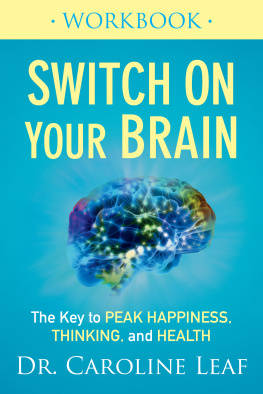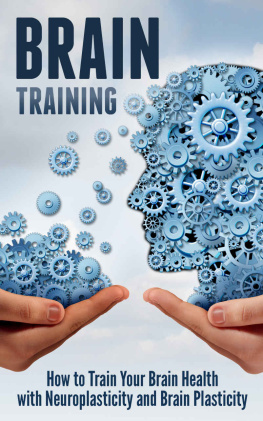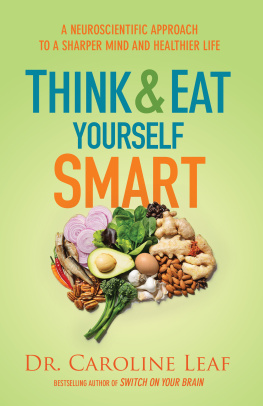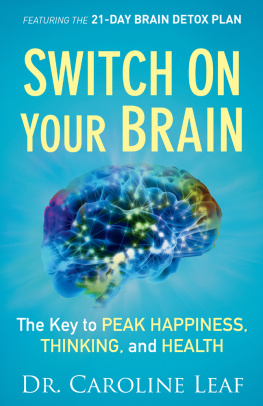Summary of Switch On Your Brain: The Key to Peak Happiness, Thinking, and Health
By
Dr. Caroline Leaf
SpeedyReads
Note to readers:
This is a SpeedyReads guide to Dr. Caroline Leafs Switch On Your Brain: The Key to Peak Happiness, Thinking, and Health meant to enhance your reading experience. You are encouraged to buy the original book.
Copyright 2018 Dr. Caroline Leaf. All rights reserved. No part of this publication may be reproduced, stored in a retrieval system or transmitted in any form or by any means, electronic, mechanical, photocopying, recording or otherwise, without prior permission of the publisher.
Limit of Liability / Disclaimer of Warranty: The publisher and author make no representations or warranties with respect or the accuracy or completeness of these contents and disclaim all warranties such as warranties of fitness of a particular purpose. The author or publisher are not liable for any damages whatsoever. The fact that an individual or organization is referred to in this document as a citation or source of information does not imply that the author or publisher endorses the information that the individual or organization provided. This is an unofficial summary & analytical review and has not been approved by the original author of the book.
Claim Your Free Gift Now
As a way of saying thank you for your purchase, were offering you a free special report thats exclusive for our book readers.
In "Delicious Reading: How to Quadruple and Enhance Your Book Reading Experience Within 24 Hours", youll discover simple but powerful ways to heighten and enhance your book reading experience that was only known by the top book connoisseurs. Until now

Go to the link below before it expires!
http://www.easysummaries.com/gift
Summary of Switch On Your Brain: The Key to Peak Happiness, Thinking, and Health
Contents
Summary of Switch On Your Brain
This book is about discovering and activating the switch that can turn on our brain and help us achieve better health and more happiness in the context of both our minds and bodies. It can also make us more intelligent and prosperous. Our minds thoughts transform our brain and body and the power to switch on our brain is part of our design. The switch is our mind.
We have the capability to define, accomplish and sustain ideal degrees of peace, joy, intelligence and mental health. We can also play an active part in shielding our mind and body against disease. By consciously focusing, we can regulate what we think and how we feel. By engaging in this activity, we can alter our brains programming and chemistry. Science is catching up with religion in this context finally.
Summary of Switch On Your Brain: Introduction
The introduction concentrates on the need to switch on our brain with hope. It refers to Hebrews 11:1. The Scripture underlines how faith serves as the substance of things we hope for and the proof of things we do not see. The related science concept accentuates that thoughts are real and physical in nature and inhabit actual space in our mind. Our thoughts alter our brain structure all the time. Hope is a mind activity that alters our brain structure to accomplish a normal and positive state.
Additionally, thoughts alter matters structure. Also, neuroplasticity refers to the brain's property of being adaptable and flexible, modifying every single moment. In harmony with religion, science is also recognizing the brain as something that is renewable instead of something that is strictly programmed in the initial phases of life and does not have the ability to adjust. Outstanding scientists discuss and exhibit the way we can alter our brain with our mind utilizing brain-imaging techniques and behavioral change evidence.
Summary of Switch On Your Brain Part 1: How to Switch on Your Brain
1: Mind Controls Matter
The main Scripture is 2 Timothy 1:7. The spirit that God has given us is of the power of love and a sound mind instead of that of fear. The relevant science concept accentuates that we have been programmed for love with a natural bias for optimism. The scientific debate lies between the brain's actions defining the mind versus the brain performing what the mind says. According to the first idea, our thoughts originate from the brain as if the brain is producing every part of our mental experiences. Those who are of this opinion are known as materialists. This view highlights that our brain is responsible for our thoughts and feelings. However, this perspective is incorrect from religious and scientific points of view.
According to the second perspective, we are thinking beings. When we engage in thinking, we end up making choices. Our choices give birth to genetic expression inside our brain. We create proteins and these proteins shape our thoughts. Thoughts are real and physical in nature and occupy actual space in a mental sense.
According to Eric R. Kandel, our thoughts and imaginations reach our DNA and can turn specific genes on and off, transforming the structure of our brain's neurons. By thinking and imagining, we change our brain structure.
Our choices regarding our attention and focus leave an impact on the way in which the chemicals and proteins and our brains wiring alter and work. Science is providing evidence for how our thoughts and our comprehension considerably affect the way in which our brain functions. Thinking triggers genes, our reactions shape our brain, and thinking transforms our DNA. Therefore, even a small amount of stress has huge side effects on our mental and physical wellbeing.
Therefore, in accord with the correct perspective, the mind has been mapped out to regulate our body, including the brain, and not vice versa. Our brain does not exercise control over us. We exercise control over our brain with the help of our thoughts and selections. We can further control our reactions to every single thing. According to research, DNA goes through actual change in reaction to our thoughts. Stress stage 1 is a normal thing. However, stress stages 2 and 3 are the responses generated by our mind and body to toxic thinking. These stages translate into normal stress taking a wrong turn. We do not have any power over what situations and occurrences life throws our way, but we do have power over our reactions to these situations.
2: Choice and Your Multiple-Perspective Advantage
The main Scripture of this chapter is Colossians 3:15 AMP. It pertains to the act of letting the peace originating from Christ govern our hearts to which we were directed as one body. The Scripture also asks us to be grateful and praise the Lord.
The related science concept signifies that choice is a reality and so is free will. We can adopt an outside perspective, monitor our thinking, ask God for guidance, and transform the negative, toxic thought or develop the healthy, positive thought. By doing this, we enable our brain to react with a positive neurochemical rush and structural alterations that will improve our health, intellect and peace. This will further cause us to have harmony of the soul.
We are not a victim of our circumstances. We have a choice and can control our reactions. Free will is not mere illusion. If we consider it to be unreal, it underlines risky inclinations since it strips us of any accountability for our actions. This can also cause us to have an excuse for everything and allow us to do as we please without any consideration of repercussions. Free will affects our thinking, which molds our state of mind. Therefore, we can make a choice to think the way God wishes for us to. The neuroscientific evidence explicates the way in which free will functions.
Next page
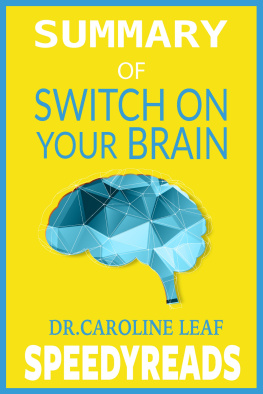
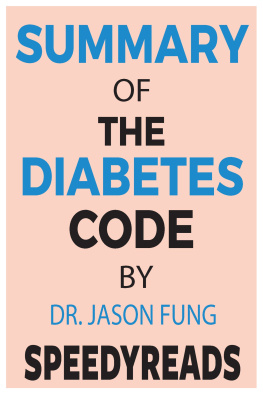

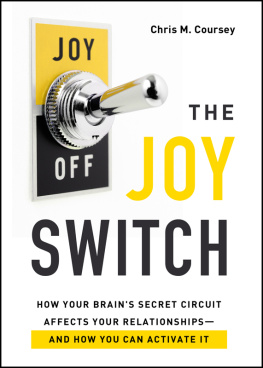
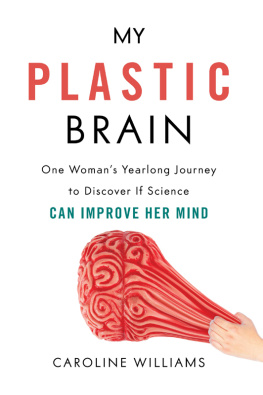
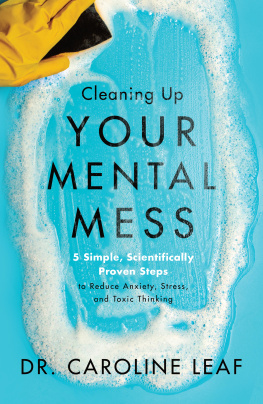

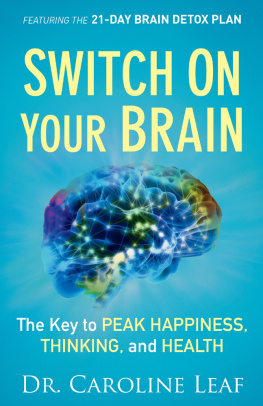
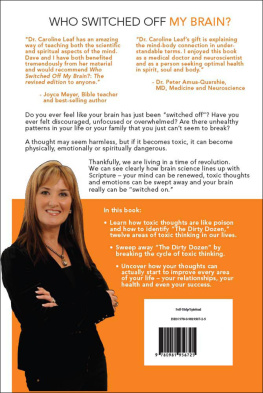
![SpeedyReads [Dell] - Summary of Switch On Your Brain; The Key To Peak Happiness, Thinking, And Health](/uploads/posts/book/117453/thumbs/speedyreads-dell-summary-of-switch-on-your.jpg)
